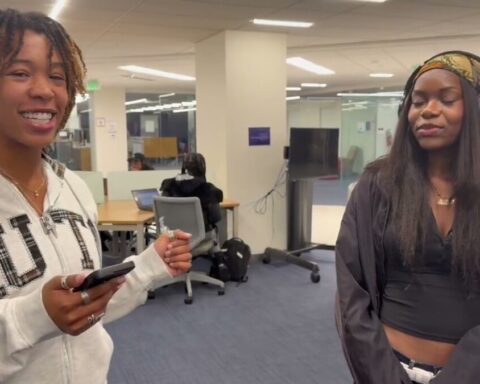WASHINGTON (HUNS) — Voting rights activist Stacey Abrams spoke about the growing challenges to democracy in the United States during a forum at Howard University on Wednesday. She shared a playbook of 10 steps communities can take to respond to the shifting political climate.
“We are in a moment where we are now facing the encroachment of authoritarianism,” said Abrams, lawyer, author and former legislator in Georgia, where she ran for governor in 2018.
“Authoritarianism is not a political ideology,” she said. “Authoritarians simply believe that your intentions and needs are not their problem.”
Abrams, the Ronald W. Walters Endowed Chair for Race and Black Politics at Howard, joined Marcus Board Jr., Ph.D., associate professor of political science and author of “Invisible Weapons: Infiltrating Resistance and Defeating Movements,” in outlining the role students, faculty and community members can play in defending democratic values.
In a wide-ranging conversation that blended political analysis with calls to civic action, Abrams and Board examined how unbalanced systems of power take root. The discussion framed democracy not as a fixed structure, but as a collective effort: an effort that demands both awareness and participation.
“If you’ve been to any of our other events, I talk about DEI all the time,” Abrams said. “It is a foundational value for the democracy we say we want to have. If you can demonize and litigate and legislate against diversity, equity and inclusion, you knocked out pluralistic democracy.”
“We live in an authoritarian country. We are watching the nation shut down, because the people in power do not value the people they serve.”
Stacey Abrams
Abrams offered a breakdown of authoritarianism and its many forms, including tyranny, oligarchy and fascism. She discussed how these systems often emerge gradually and pointed to international trends as a warning for the United States.
She recounted a conversation with Kim Lane Scheppele, a Princeton professor who studied Hungary’s decade under authoritarian rule by Viktor Orbán. “She laid out the steps to authoritarian rule,” Abrams recalled. “And she said, no matter how you examine it, they all do the same things.”
Abrams explained that the United States, like Hungary, has already completed those steps.
“We live in an authoritarian country. We are watching the nation shut down, because the people in power do not value the people they serve.”
The federal government shut down early Wednesday after Congress failed to pass a spending bill, with Democrats pushing to include health care protections and Republicans saying the issue should be handled separately. Despite controlling the White House and both chambers of Congress, Republicans blamed Democrats for the stalemate.
Inspired by Scheppele’s research, Abrams adopted the same steps, not as a prediction, but as a framework for resistance. She turned them into a proactive strategy called the “10 Steps to Freedom and Power” campaign, aimed at countering authoritarian threats.
“Step one is calling it what it is,” Board explained, encouraging students to identify and name authoritarian tendencies early.
Board and Abrams continued urging attendees and students to acknowledge their power and sovereignty while following those 10 steps.
The second step, which Abrams said is especially important for students, is “share.”
“We have to share what we know,” Abrams said. “We are in a fortunate place to be having this conversation, and what we learn here, we must share with our communities. You have the opportunity as students to help them navigate the space as their own.”
Abrams emphasized that everyone has a role to play, and those roles won’t always look the same or be in complete agreement. However, she said, the power lies in alignment, not uniformity.
“My point is, in movement building, we need everyone. There’s got to be space for all of us in this moment. We also have to lift up the people doing the most and elevate them, so when we reach the next stage, we have the right people ready for it. It’s a joint effort.”
Board closed with a resolute message: “We persevere until we win. We fight until we win.”
Belaynesh Shiferaw is a reporter for HUNewsService.com.











